The Institute’s strategy
The starting point of the IPS Strategy is a SWOT analysis of the Institute’s resources, which has revealed its strengths and weaknesses. On this basis, we have taken actions supposed to compensate for the diagnosed deficits and strengthen the positive aspects. Generally, we will be implementing the strategy for 2025 on a priority basis in five areas that constitute an interconnected system: STAFF, RESEARCH, VISIBILITY, EXTERNAL COOPERATION, and INTERNATIONALISATION. In each of these areas, actions have been undertaken to strengthen the Institute’s potential and to support its competitive position in Poland and internationally. The strategy goals have been divided into short-term (2021) and long-term (2025) ones. The former are aimed at meeting the evaluation criteria for the years 2017–2020. The latter are related to a larger extent to the Institute’s networking with its external and international environment and to the strengthening of its scientific core. The implementation of the short- and long-term goals will be supported by research teams appointed from January 2020, whose activities will involve people from outside the IPS and the University of Silesia – experts from the external environment, researchers, and representatives of other fields.
In the area of STAFF, a research and teaching job profile has been created, corresponding to the highest extent to the goals set. The profile has been collated with the current IPS staff, and the actions undertaken are intended to compensate for the deficits found. A support and motivation system has been put into operation, adequate to the needs of the employees. In the RESEARCH area, areas have been identified which will be developed as a priority within the IPS. Most staff members conduct their research within these areas, which include political behaviour, cybersecurity, political and party systems, political corruption and pathologies, depopulation and migrations, and public policies. These areas fit directly within the three Priority Research Areas defined in the strategy of the University of Silesia: PRA 1: Harmonious human development – concern for health protection and quality of life; PRA 2: Modern materials and technologies and their socio-cultural implications; PRA 3: Environmental and climate changes with the accompanying social challenges. As part of VISIBILITY, we have undertaken activities aimed at promoting research conducted by IPS employees. Among other things, we have designed a Media Centre to support this group of goals to a significant extent. The purpose of EXTERNAL COOPERATION is to activate the operations of the Business and Programme Council, whose members include representatives of the most important external institutions of the Institute’s external environment. We have also created an offer of cooperation in the area of scientific research commercialisation. As far as INTERNATIONALISATION is concerned, the goal is to improve the visibility of the Institute’s employees and of the results of their research outside Poland. This involves supporting the presence of researchers at congresses and conferences of the highest importance for political sciences (APSA, IPSA, ECPR), formalising many areas of international cooperation through bilateral agreements, and applying for grants in international teams.
The strategic goal of the IPS is to obtain the B+ rating in the next evaluation (2021) and A in the following one. The strategy presented is aimed not only at improving the indicators under evaluation, but above all at taking in-depth measures oriented towards cultural change, instilling an adequate system of values in the team to encourage motivation and internal willingness to act for the good and development of the individual.





